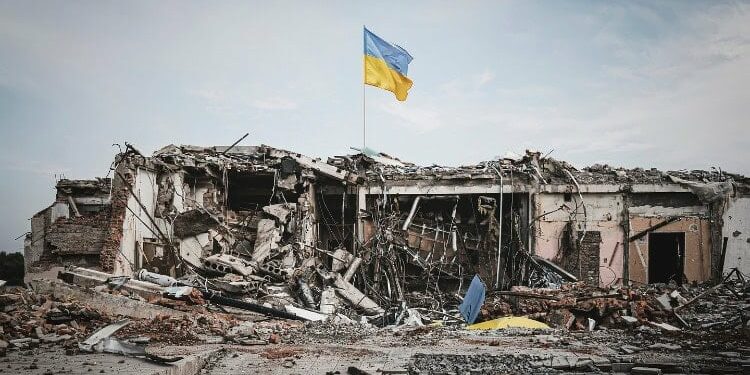Click here to become a member
Even the thinking of the political apparatus and commentariat rarely extends beyond morally charged symbolism and magical incantations. ‘Clear stance against the right, clear edge against Putin, clear stance against anti-Semitism’ replace internal structural reforms and repositioning in a changed geopolitical environment.
Groupthink illusions
With the return of war to Europe, reality now intrudes into this post-political order, shattering illusions of groupthink. High inflation has forced central banks to abandon low-interest policies. The magic potion against economic downturns and debt crises is no longer available. Instead, decades of underinvestment have exposed the structural weaknesses of European economies.
Fierce geo-economic competition also closes off the opportunity to export one’s way out of the crisis. In an increasingly protectionist world, securing the European home market becomes essential. Therefore, the taboo of transfer payments to stabilise southern-European debtor states will likely waver in the medium term.
Despite the rhetoric of value-driven foreign and climate policies, expensive fossil fuels from authoritarian regimes are imported to reduce dependence on cheap Russian energy. To prevent expensive energy from undermining competitiveness, energy prices are subsidised. Suddenly, the two holy cows of green policy in Germany—the wisdom of nuclear phase-out and the technical feasibility of the energy transition—are up for debate.
To remain competitive, Europeans must counter American industrial subsidies (the Inflation Reduction Act) and Chinese overcapacity. The return of the primacy of national security has led not only to a renaissance of industrial policy but more generally revoked the neoliberal ban on state intervention in the economy. Confidence in the efficiency of market forces is replaced by state-managed derisking to strengthen resilience.
The irresistible pressures of geopolitical competition turn free traders overnight into protectionists. After the collapse of the hope of ‘peace through interdependence’ with China and Russia, supply chains are shortened (near-shoring) and relocated to friendly states (friend-shoring). The neoliberal phase of globalisation is thus over.
To finance the restoration of the deterrence capability of the western alliance, the maintenance of dilapidated infrastructure, the competitiveness of European industry and the climate and energy transition, investments will be necessary that exceed anything in recent memory. In Germany, a new consensus is emerging that the sacred cow of ordoliberalism—the debt brake—must be slaughtered. But cuts in social transfer payments will also return to the agenda. The skirmishes over who will bear the costs of these mega-investments is disrupting political-party systems across Europe.
The reconstruction of the arms industry and the rearmament of underfunded militaries will not be sufficient for the restoration of defensibility. Post-heroic attitudes among the majority population and the progressive fringe’s obsession with toxic masculinity are also likely to disappear.
Long-neglected problems with irregular migration and integration (violence and clan crime, Islamist indoctrination) have forced a turnaround in migration policy. Germany is thus switching to the course long taken by Denmark, Sweden, Italy and France.
Anti-system parties
The European elections have shown that a fight against the right, conducted solely through moral delineation, cannot succeed. Citizens want solutions to the problems they face amid all the crises and upheavals, not an endlessly repeated ‘final battle for democracy’. If established parties persist in opposing the will of the majority, the democratic sovereign will turn to new providers who promise to break through the system’s blockade. Stubborn adherence to liberal beliefs thus opens the door to anti-system parties that can undermine or destroy the institutions of liberal democracies.
The tremors underfoot have caused panic among liberal elites and tempted illiberal overreactions both inward and outward. Externally, value-based foreign policy is rejected by global-south states as interference in internal affairs. The narrative of the epic struggle between democracies and autocracies fails to resonate. The west is accused of double standards, not least because of its contradictory policies towards Ukraine and Gaza. The defence of a rules-based world order is increasingly falling on deaf ears.
Internally, freedom of expression, constitutive of liberal democracy, is disparaged as ‘bullshit’. Calls for tougher laws against speech deemed illegitimate are incessant. Conversely, vehement denials persist that there is such a thing as ‘cancel culture’.
Survey after survey shows, however, that broad majorities reject liberal post-politics. The majority of the population views new challenges with sobriety and pragmatism but is outraged that liberal elites do not honestly explain who will bear the costs of policy changes. Sooner or later, this issue will have to be addressed, because strong democratic mandates are needed to tackle these mammoth tasks.
The intrusion of reality could therefore lead to a reconciliation between the people and the elites. If citizens can be brought along, the democratic centre will hold, and the assault of illiberal forces on democracy will fail.
Marc Saxer is a member of the SPD’s Basic Values Commission. His book Transformative Realism: Overcoming the System Crisis was published in 2021.
Source link : https://www.socialeurope.eu/reality-bites-the-incursion-of-the-real-into-post-politics
Author :
Publish date : 2024-07-23 07:00:00
Copyright for syndicated content belongs to the linked Source.




